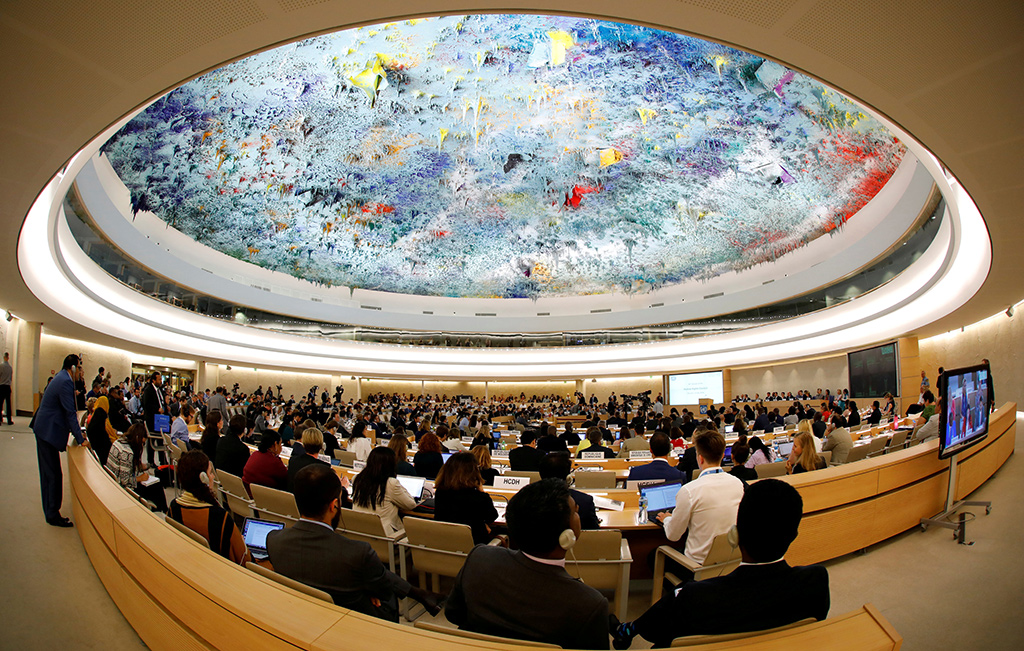Sri Lanka has accused a UN Rapporteur of unfair judgement of the space for freedom of religion or belief in Sri Lanka through the few months that followed the Easter Sunday attacks.
Sri Lanka said that it took note of the report of Mr. Ahmed Shaheed, Special Rapporteur on freedom of religion or belief following his visit to Sri Lanka from 15 to 26 August 2019, which has been presented to the UN Human Rights Council yesterday (Monday).
The advanced unedited report of the Special Rapporteur (SR) was shared with Sri Lanka, for comments, on 3 February 2020, with a deadline of 28 February 2020, i.e. last Friday, leading to an Interactive Dialogue thereon yesterday – Monday.
Sri Lanka informed the Council that it received the SR in August 2019, barely 4 months after the country had suffered a series of horrendous terrorist attacks by certain local groups inspired by ISIS which targeted innocent civilians at worship and at hotels on Easter Sunday, causing the death of 258, including 45 foreign holiday makers.
“The people of Sri Lanka have lived amicably despite racial and religious differences for centuries, and continue to do so. Having suffered the scourge of separatist terrorism for nearly three-decades, they had been enjoying their hard-won peace and freedom, and had embarked on the path of reconciliation and national healing over the last decade. However, the Easter Sunday attacks reminded us that we are fighting a common adversary in terrorism, radicalization and extremism, which is a global threat,” the Sri Lankan delegation at the Council said.
In this context, Sri Lanka said that it considers it unfortunate that the SR’s report has, to a large extent, sought to judge the space for freedom of religion or belief in Sri Lanka through the few months that followed the Easter Sunday attacks.
“As may be recalled, the scale of these attacks brought about a national emergency in Sri Lanka which called for prompt action by the State to identify and neutralize terrorist elements in different parts of the country in the interest of safety and security of all communities, while maintaining the delicate balance between national security and human rights. In the aftermath of the attacks, the Government immediately took all possible measures to prevent any retributive acts of civil unrest, maintain law and order, and most importantly to ensure the safety and security of all people, particularly the Muslim community,” Sri Lanka said.
The Sri Lankan delegation said that the constructive and reconciliatory approaches and calls made by the civil and political leadership of the country which helped contain the situation were widely acknowledged and appreciated.
“The Muslim community particularly took proactive measures to cooperate with the security agencies in their investigations and search operations. Suspects who were arrested were afforded their legal safeguards and independent institutions were provided access to monitor their situation,” the delegation said.
Sri Lanka also said that the incidents of mob violence that occurred 3 weeks after the terrorist attacks were not communally motivated but caused by unruly elements.
“Therefore, the Government rejects the inaccurate references in the SR’s report to “serious concerns” regarding “Sri Lankan security forces colluding with mobs and not acting to prevent or stop the violence”; the “lack of response from the authorities against this violence”; and the claims that “acts of violence are indulged by the silence and inaction from the authorities”. It is regrettable that these inaccurate accounts have been included in the report, even after they have been fully rebutted and explained by the Government soon after the alleged incidents,” Sri Lanka said.
The Sri Lankan delegation also said that it was regrettable that the report has sought to portray instances where criminal investigations have been conducted to prevent acts of terrorism in accordance with the law, as an endeavor to violate the freedom of religion or belief.
With regard to references to restrictions on dress code, Sri Lanka noted that the regulation concerned was a temporary measure under the Emergency Regulations aimed at preventing concealing of identity, in view of the imminent security threat that existed at the time.
Sri Lanka also categorically rejected the inaccurate assertion in the report that the ICCPR Act has not been applied to protect minorities but has become a “repressive tool” curtailing freedom of religion or belief. In this regard, we wish to point out that since its enactment in 2007 to date, 90% of the suspects who were arrested under the ICCPR Act have been from the majority Sinhala community. (Colombo Gazette)

